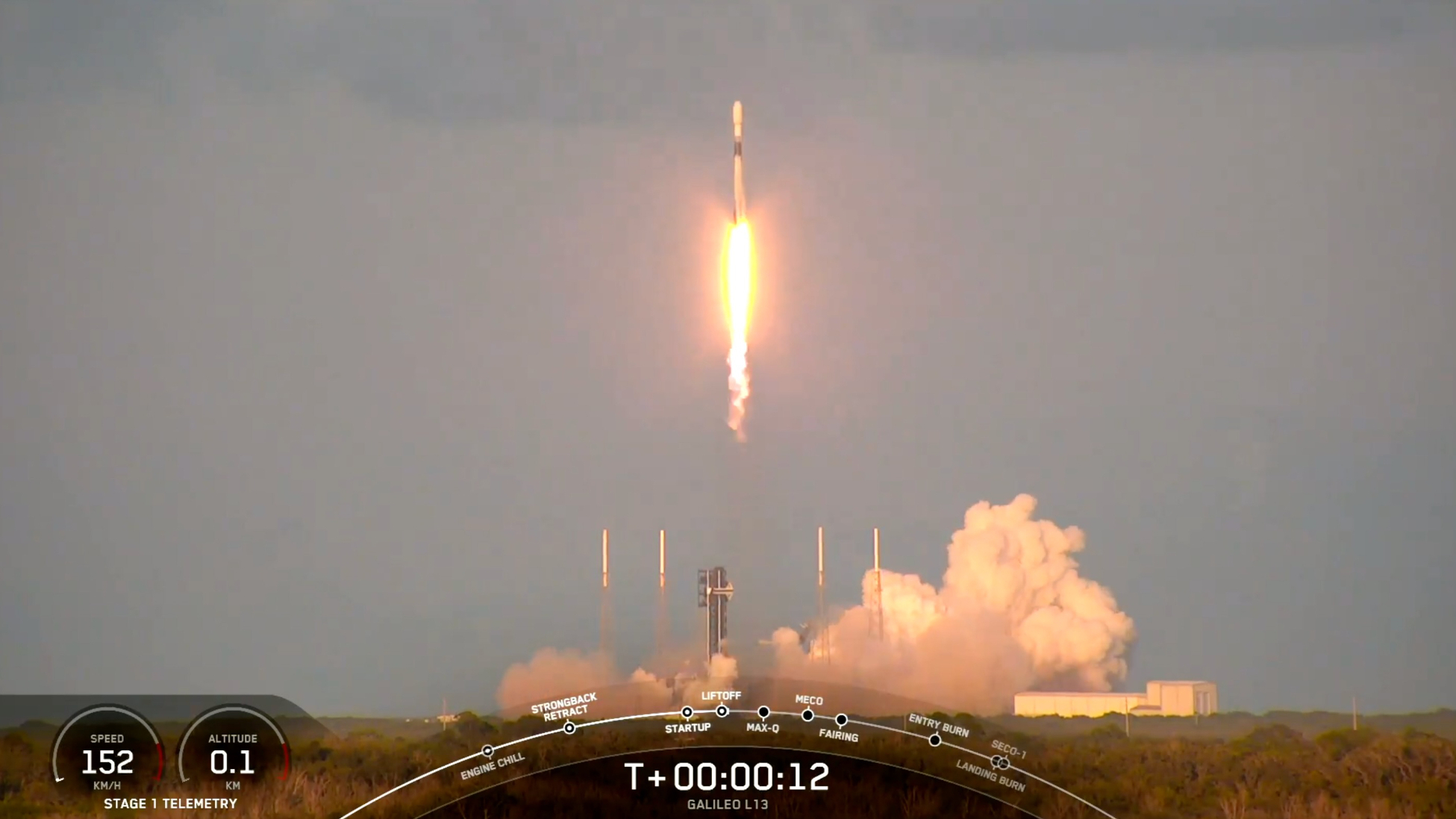A SpaceX Falcon 9 rocket launched two European navigation satellites tonight (Sept. 17) and then landed safely, acing its 22nd mission.
The Falcon 9 rocket, carrying two spacecraft for Europe's Galileo satnav constellation, lifted off from Cape Canaveral Space Force Station in Florida tonight at 6:50 p.m. EDT (1850 GMT).
The Falcon 9's first stage returned to Earth safely as planned, landing at sea on the SpaceX droneship "Just Read the Instructions" about 8.5 minutes after launch. According to a SpaceX mission description, it was the 22nd liftoff and landing for this particular booster — one shy of the company's reuse record.

The Falcon 9's upper stage, meanwhile continued hauling the two Galileo satellites toward medium Earth orbit. If all goes to plan, it will deploy them there about 3.5 hours after launch.
Related: SpaceX launches 2 Galileo navigation satellites to orbit (video)
The Galileo constellation — Europe's equivalent of the United States' Global Positioning System (GPS) — resides at an altitude of 14,430 miles (23,222 kilometers). Thirty-two Galileo satellites have now launched to date, all but four of them atop Russian-built Soyuz rockets or Europe's Ariane 5 heavy lifter.
The first two outliers launched this past April atop a Falcon 9. Europe signed a Galileo launch deal with SpaceX in late 2023 after its other options dried up: It cut most space ties with Russia following the February 2022 Ukraine invasion, and the Ariane 5 retired last summer. (The Ariane 5's replacement, the Ariane 6, launched for the first time this past July.)
Get the Space.com Newsletter
Breaking space news, the latest updates on rocket launches, skywatching events and more!
The SpaceX launch contract covers up to four Galileo spacecraft, so tonight's liftoff presumably fulfills it.
On the April Galileo launch, the Falcon 9's first stage did not try to make a safe landing; rather, it ditched into the sea, lacking the fuel to steer itself back for a vertical touchdown.
Tonight's mission is sending the satellites to the same distant orbital destination. But SpaceX learned enough from the first Galileo liftoff to bring this Falcon 9 home in one piece.
"Data from that mission informed subtle design and operational changes, including mass reductions and trajectory adjustments, that will allow us to safely recover and reuse this booster," the company wrote in the mission description, which it posted before tonight's launch.
"This landing attempt will test the bounds of recovery, giving us valuable data on the design of the vehicle in these elevated entry conditions," it added. "This in turn will help us innovate on future vehicle designs to make our vehicles more robust and rapidly reusable while expanding into more challenging reentry conditions."
Editor's note: This story was updated at 7:45 p.m. ET on Sept. 17 with news of successful launch and booster landing.
Join our Space Forums to keep talking space on the latest missions, night sky and more! And if you have a news tip, correction or comment, let us know at: community@space.com.

Michael Wall is a Senior Space Writer with Space.com and joined the team in 2010. He primarily covers exoplanets, spaceflight and military space, but has been known to dabble in the space art beat. His book about the search for alien life, "Out There," was published on Nov. 13, 2018. Before becoming a science writer, Michael worked as a herpetologist and wildlife biologist. He has a Ph.D. in evolutionary biology from the University of Sydney, Australia, a bachelor's degree from the University of Arizona, and a graduate certificate in science writing from the University of California, Santa Cruz. To find out what his latest project is, you can follow Michael on Twitter.









